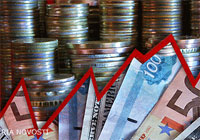Business Mood Brightens, But Won’t Save Russian Economy, Study Finds

(Moscow Times – themoscowtimes.com – Delphine d’Amora – July 16, 2014) Economic sentiment among Russian businesses improved in the second quarter, but the effect was largely seasonal and shot through with troubling long-term trends, a study published by the Higher School of Economics found.
As the mood in retail and the services industry brightened – largely thanks to traditionally strong demand for food products and seasonal services in the spring and summer – the spirits of entrepreneurs in construction and manufacturing continued to slide.
“It is clear that in the second quarter the consumer sector, including retail and the services sphere, remained the driver for sluggish growth in the Russian economy,” the study, published Monday, found.
Businessmen in manufacturing most often attributed their negative ratings to”insufficient demand for products,” while businessmen in construction and retail complained of high taxes.
Economic sentiment as a whole rose to 99.3 – still in the negative zone of the indicator, with 100 indicating neutral. This was a clear improvement from the first quarter of the year, when the indicator fell to 97.1 amid a drastic decrease in investment in the Russian economy and resulting slowdown in economic growth.
But the improvement is likely a temporary reprieve, as Russia is experiencing “a deficit of growth drivers,” according to Georgy Ostapkovich, director of the Higher School of Economics’ Center for Business Tendencies Studies, which conducted the survey.
“Now it is much more profitable for entrepreneurs to engage in trade, provide services, perform financial operations – in other words to engage in fast-moving business with a quick payoff – than it is to invest in long-term production,” Ostapkovich said.
In order to overcome this hurdle, he said, the government must solve an array of well-known problems: create a transparent and reliable legal system, promote competition and increase access to loans for investment.
Unfortunately, businesspeople have not only gotten used to the current, short-term development scenario, but “learned to extract significant bonuses from it,” Ostapkovich said.
Instead of using extra capital to develop their businesses, many companies simply put the money toward salaries. As a result, salaries in many companies – and especially state-owned ones – are increasing faster than labor productivity, he said.
The center’s quarterly study polls more than 20,000 business leaders in the manufacturing, construction, retail and services sectors, which together account for more than 60 percent of Russia’s GDP.
